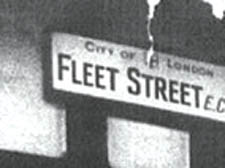|
|
 |
| |
Hacking into hot metal times
Towards the End of Morning.
By Michael Frayn. Faber paperback £7.99 Order this book
MICHAEL Frayn’s heartfelt and humorous novel is set in what was once Fleet Street – “a (pre-computerised) world that has now vanished as completely as the Fleet Ditch that gave the Street its name,” he says in his introduction. “The appearance of anything new in this rundown world seemed as unlikely as the birth of a baby in an old-folk’s home.”
From the very first line, the atmosphere is subtly visualised as if written by a painter: “The sky grew darker and darker as the morning wore on.”
John Dyson, who is heading for a crack-up, works with the non-confrontational and forever toffee-sucking Bob, and the mostly dead-to-this-world Eddy Moulton, in the same room of an unnamed newspaper office firmly stuck in a 1950s time warp.
Dyson, the head of department, has Bob and Eddy to help him replenish four main stockpiles: a daily column called In Years Gone By, the crossword, the nature notes and meditations, for which he is forever having to jog the memory of some flatulent Anglican canon. He also slithers off to do the occasional broadcast at the BBC World Service at Bush House for 20 guineas.
Frayn makes it crystal clear that Dyson is not the “ruined scholar” type of journalist “who could review you at short notice a book about Lord Northcliffe or Hugh Kingsmill”.
His aspirations begin to be met when he gets himself on a TV discussion programme with Lord Boddy, to whom he becomes more and more embarrassingly deferential the more drunk the two of them become. A small example: “I should just like to say that I find what Lord Boddy is saying extraordinarily interesting. Extraordinarily interesting.”
Not surprisingly, this nauseating deference perplexes his wife Jannie: “But why does he keep saying things like ‘extraordinarily interesting’ and ‘indeed, indeed’? I’ve never heard him say anything like that before,” she says. Why indeed?
Frayn has a particular gift for the dialogue of toffee-sucking Bob and his friend Tessa – neither of whom can make up their minds about anything, even for a second, least of all whether they are engaged or not.
This classic novel is a slow-burner, and a compulsive page-turner.
John Horder
|
 |
|
 |
 |
|
 |
|



